
by Scott Yanow A very appealing singer with a warm voice and the ability to express the hidden beauty found in superior lyrics, Maria Guida recently recorded her debut CD, Soul Eyes. Throughout this impressive “I was blessed with some of the best musicians around,” recalls Maria, “and they made it easy, fun and relaxed. I love pianist James Weidman’s playing. He’s very lyrical, his harmonic sense is beautiful, and he plays wonderful ideas that inspire and support my singing. I’ve known bassist Dean Johnson for 20 years, and this is the first time we’ve ever played together. I love his full, rich tone – and his solos are always beautiful and often capture a spirit of fun. Drummer Tony Moreno and I did a couple of gigs together over the years, and I’ve always loved his tasteful playing. He puts a lot of fire and excitement into the music and, at the same time, his drumming is very sensitive with singers. Ron Horton is a phenomenal trumpeter and flugelhorn player. I love his soulful sound, his musical ideas, and his emotional intensity. I am so thrilled that they are all on this CD.” While most of the standards on Soul Eyes are familiar, these versions are unique. “It was very important to include a bit of myself and my take on the world, because so many people have recorded standards. I wanted to create a CD that brings these beautiful tunes to life in a way that was a bit different from the way other people have done them, with my point of view.” Certainly this version of the opening “How Little We Know” differs from previous renditions. It is given a gentle interpretation as Maria sings about the mystery of love, and i “The thing I love about ‘Inside A Silent Tear’, a beautiful song written by Blossom Dearie, is how it allows the message to shine. Love can be tearful and love can be sad. We sometimes make wrong choices in love, but the feeling behind this tune keeps it from being depressing. It’s a very truthful song.” Maria digs so deep into the lyrics that eventually the words are not even necessary to express her feelings and she sings wordlessly for a chorus. Ron Horton’s flugelhorn blends beautifully with her in several spots.
The next two songs pay tribute to John Coltrane. On “Bessie’s Blues”, Maria sings Coltrane’s memorable solo in addition to the melody. The most famous version of Mal Waldron’s “Soul Eyes” was recorded by Coltrane in 1962. “I have always been very moved by the beauty of this song. I was surprised to discover that, in addition to the gorgeous melody, Mal Waldron also wrote the lyrics.”
“Let’s Get Lost” is closely identified with Chet Baker and is given a joyful, swinging and carefree rendition. “I really love Chet Baker and I used to memorize a lot of his solos. This song always brings a smile to my face.” Also quite happy is “East Of The Sun”, which is described by Maria as “a beautiful picture of an ideal situation.” On “Spring Is Here”, Maria perfectly balances the sadness of not being loved with the happiness generated by the arrival of spring. In addition to its opening theme, “The Way You Look Tonight” was given a new set of lyrics and a fresh melody composed by Maria that fits in with the vintage piece’s original plot. “Jay Clayton suggested that I sing ‘The Night We Called It a Day’. I love its play on words and the way that it expresses feelings through visions of nature.” This heartfelt version really shows off the beauty of Maria’s voice. The singer’s playful side is displayed on “No Moon At All”, which (with its sly wit) hints at what could happen in the darkness of the night when no moon is shining. Maria sings Miles Davis’ solo with Jon Hendricks’ lyrics on “Four”. A quietly emotional version of Billy Strayhorn’s “A Flower Is a Lovesome Thing”, taken as a duet with Weidman’s piano, serves as a perfect close for Soul Eyes. Maria Guida grew up on Long Island. As a child, she heard her parents’ opera, pop, and musical theater records and her mother singing American popular songs around the house. Growing up, Maria played violin for eleven years with a string quartet and all-state orchestra and sang solos in a chorus. She then chose a career in the theater and trained as an actor (with Olympia Dukakis as one of her mentors/teachers). Over a fifteen year period, Maria acted on Broadway and television, was featured in plays by Shakespeare, Chekhov and Tennessee Williams, worked in n The turning point of her professional life occurred when she saw pianist Bill Evans play live. “Once I got hooked on jazz, I became passionate about singing this music. I started listening to Charlie Parker, Chet Baker, Miles Davis, Lester Young, and Charlie Mingus.” Very important in Maria’s career were the lessons that she received from singers Jay Clayton, Sheila Jordan, and Janet Lawson. “Jay Clayton, who is a real innovator and was my first teacher, gave me the courage to be as inventive as I can be. She’s helped me to see that there are no sounds that are off limits. And it is impossible to overemphasize the impact that Sheila Jordan had on my singing. She opened my ears and helped me get in touch with how to bring myself to any given song. Honesty is first and foremost; music and lyrics are a way into the soul. And Janet Lawson was another generous teacher who helped me with harmony and other aspects of singing this music.” Over the years, Maria has sung in many clubs with such top musicians as pianists Bruce Barth, Kenny Werner, and Pete Malinverni; bassists Essiet Essiet, Cameron Brown and Ed Schuller; drummers Ron Vincent and Tom Rainey -- as well as the musicians featured on Soul Eyes. She has also performed on stage with acclai Maria Guida looks forward to the future with enthusiasm. “I have been expanding my repertoire and my sound, becoming a more explorative singer, and searching for the core meaning of each song. I am very interested in the musical interplay between the instrumentalists and myself, and want to keep expanding as a singer. I love the songs that I’ve recorded and hope that listeners will have as much joy when they hear these songs as I have when I sing them. I am very grateful for the opportunity to sing this music.” The release of Soul Eyes promises to raise the visibility of Maria Guida in the jazz world, making it possible for many new fans to discover the beauty, sincerity, and joy of her singing.
|
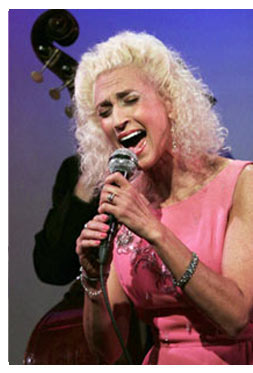 and highly enjoyable set, the beauty of Maria’s voice is equaled by her understanding of the words and the creative spirit of her musicians. In fact, there was such an immediate communication between all of the participants that Soul Eyes was recorded in its entirety in one day.
and highly enjoyable set, the beauty of Maria’s voice is equaled by her understanding of the words and the creative spirit of her musicians. In fact, there was such an immediate communication between all of the participants that Soul Eyes was recorded in its entirety in one day.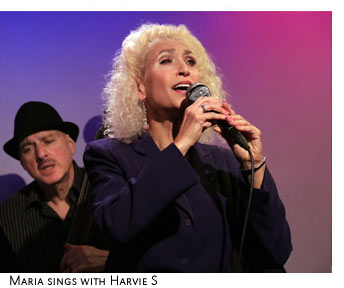 t becomes quite touching near its end when the tempo slows down.
t becomes quite touching near its end when the tempo slows down.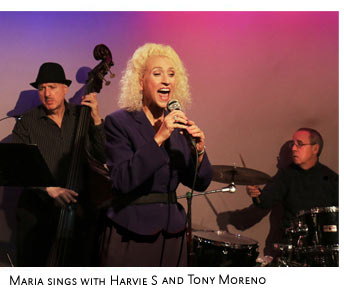
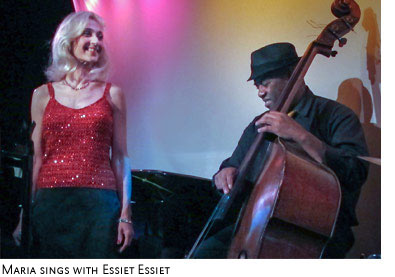 ew productions, had roles in soap operas, and did TV commercials. “I was fortunate to work on stage with many wonderful actors, including Kevin Kline and Estelle Parsons, and to be directed by James Earl Jones and Tom O'Horgan.” She was also cast by Joseph Papp for the New York Shakespeare Festival’s Shakespeare in the Park.
ew productions, had roles in soap operas, and did TV commercials. “I was fortunate to work on stage with many wonderful actors, including Kevin Kline and Estelle Parsons, and to be directed by James Earl Jones and Tom O'Horgan.” She was also cast by Joseph Papp for the New York Shakespeare Festival’s Shakespeare in the Park.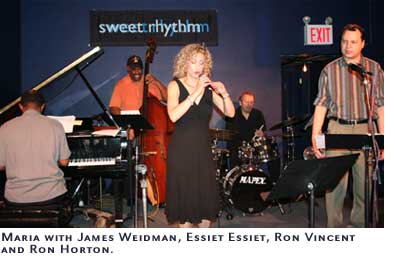 med singers, including
med singers, including